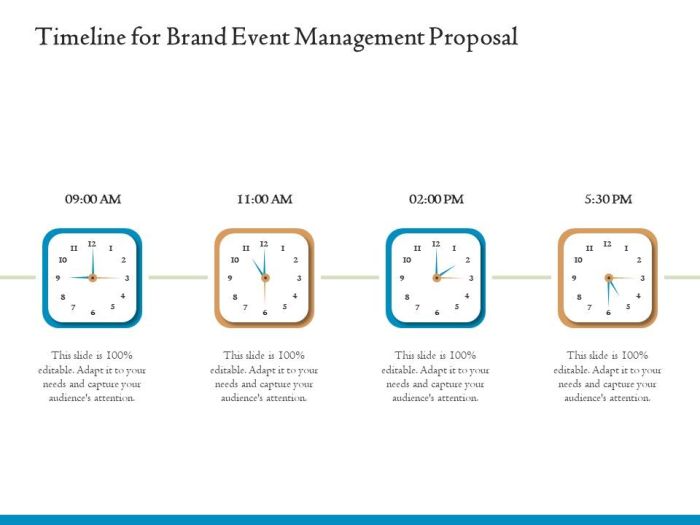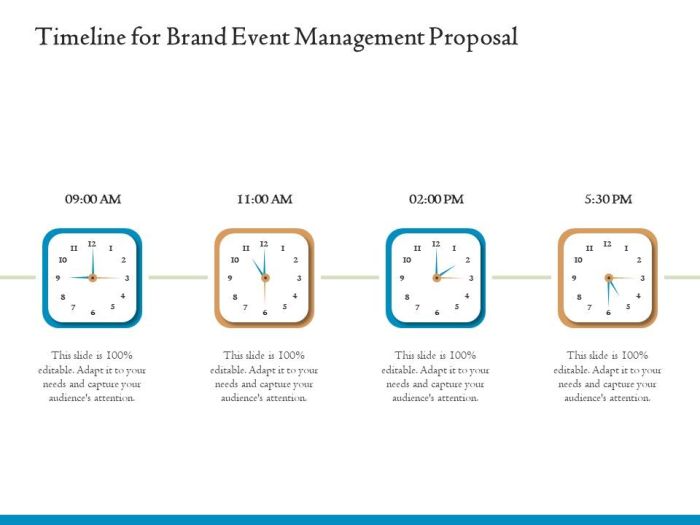Event Planning for Brands takes center stage, inviting readers into a world of creativity and strategy. From enhancing brand visibility to creating unforgettable moments, this topic delves into the art of crafting successful brand events.
Importance of Event Planning for Brands
Event planning plays a crucial role in the success of brands by providing opportunities for direct engagement with consumers, creating memorable experiences, and increasing brand visibility. Well-organized events can significantly enhance a brand’s reputation and image in the market.
Enhanced Brand Visibility and Reputation, Event Planning for Brands
Organizing events allows brands to showcase their products or services in a unique and interactive way, attracting the attention of consumers and the media. By creating a memorable experience for attendees, brands can leave a lasting impression and build a positive reputation. For example, Apple’s product launch events generate buzz and excitement, positioning the brand as innovative and cutting-edge.
Successful Brand Events and Impact
Some successful brand events include Nike’s “Just Do It” campaign launch with high-profile athletes, which reinforced the brand’s association with sports and athleticism. Another example is Coca-Cola’s “Share a Coke” campaign, where personalized bottles increased consumer engagement and loyalty. These events not only generated brand awareness but also strengthened the emotional connection between consumers and the brands.
Key Elements of a Successful Brand Event

To ensure a brand event is successful, there are several key elements that need to be carefully considered and executed. These elements play a crucial role in creating a memorable experience for attendees and effectively conveying the brand’s message.
Branding
Branding is one of the most important elements of a successful brand event. It involves creating a cohesive and consistent identity that reflects the brand’s values, mission, and personality. From the event theme to the color scheme and even the logo placement, every aspect should align with the brand’s overall image.
Messaging
The messaging of a brand event is another critical component. It should be clear, concise, and align with the brand’s objectives. Whether it’s through keynote speeches, presentations, or promotional materials, the messaging should effectively communicate the brand’s story and engage attendees on a deeper level.
Target Audience
Understanding the target audience is key to planning a successful brand event. By knowing who the attendees are, their preferences, and what resonates with them, you can tailor the event to cater to their needs and interests. This will help create a more personalized and engaging experience for the attendees.
Creating Engaging Experiences
To make a brand event truly memorable, it’s essential to create engaging experiences for the attendees. This can include interactive activities, workshops, live entertainment, or even hands-on demonstrations. By incorporating these elements, you can captivate the audience and leave a lasting impression that strengthens the brand’s relationship with its customers.
Budgeting and Financial Planning for Brand Events
When it comes to planning brand events, budgeting and financial planning play a crucial role in ensuring the success of the event. Proper budgeting helps in allocating resources effectively and maximizing the impact of the event on the brand.
Importance of Budgeting in Event Planning for Brands
Budgeting in event planning for brands is essential to ensure that all aspects of the event are covered within the allocated budget. It helps in determining the scale of the event, setting realistic goals, and making informed decisions about where to allocate resources. Without a well-defined budget, brands may overspend or underspend, leading to potential financial risks or missed opportunities.
Strategies for Maximizing Resources and Optimizing Costs
- Set clear objectives: Define the goals of the event to align budget allocations with desired outcomes.
- Research and negotiate: Explore different vendors, venues, and suppliers to find cost-effective options and negotiate prices to optimize costs.
- Track expenses: Regularly monitor expenses to stay within budget and identify areas where adjustments can be made to optimize resources.
- Utilize sponsorships and partnerships: Collaborate with sponsors or partners to share costs and increase the budget for the event without compromising quality.
- Consider alternative options: Explore creative solutions, such as virtual events or hybrid formats, to reduce costs while still delivering a memorable experience.
Cost-Effective yet Impactful Brand Events Examples
“One example of a cost-effective yet impactful brand event is hosting a pop-up shop in a high-traffic area to create buzz and engage with customers directly. Another example is organizing a community service event where the brand gives back to the community while enhancing its reputation.”
Marketing and Promotions Strategies for Brand Events: Event Planning For Brands

Marketing and promoting brand events effectively is crucial to ensure a successful turnout and engagement from the target audience. By leveraging various promotional channels and social media platforms, brands can create buzz and excitement around their events. Let’s dive into some strategies and tips for marketing brand events:
Utilize Social Media Platforms
Social media has become a powerful tool for event promotion. Brands can create event pages, run targeted ads, and engage with their audience through platforms like Facebook, Instagram, and Twitter. By utilizing hashtags, creating engaging content, and partnering with influencers, brands can reach a wider audience and generate interest in their events.
Email Marketing Campaigns
Sending out targeted email campaigns to your subscriber list can be an effective way to promote brand events. By including enticing visuals, event details, and exclusive offers, brands can encourage their audience to RSVP and attend the event. Personalized email marketing can help create a sense of exclusivity and excitement among attendees.
Collaborate with Partners and Sponsors
Partnering with other brands, influencers, or sponsors can help amplify the reach of your event. By collaborating on co-branded content, hosting joint giveaways, or cross-promoting each other’s events, brands can tap into each other’s audiences and increase event attendance. This can also help in sharing the cost of promotions and reaching a wider demographic.
Create Engaging Content
To capture the attention of your target audience, it’s essential to create engaging content leading up to the event. This can include teaser videos, behind-the-scenes sneak peeks, interactive polls, and user-generated content. By building anticipation and excitement, brands can drive interest and attendance for their events.
Offer Exclusive Incentives
Providing exclusive incentives such as early bird discounts, VIP access, or limited edition merchandise can entice attendees to RSVP and participate in brand events. By creating a sense of exclusivity and offering unique perks, brands can attract a loyal following and generate buzz around their events.
